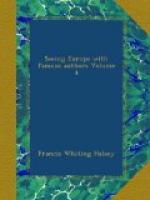The little republic of Andorra, hidden away in the fastnesses of the Pyrenees between France and Spain, its allegiance divided between the bishop of Urgel in Spain and the French government, is a relic of medievalism which will probably never fall before the swift advance of twentieth century ideas of progress. At least it will never be overrun by automobiles.
From French or Spanish territory this little unknown land is to be reached by what is called a “wagon-way,” but the road is so bad that the sure-footed little donkeys of the Pyrenees are by far the best means of locomotion, unless one would go up on foot, a matter of twenty kilometers or more from Hospitalet in Spanish or Porte in French territory.
The political status of Andorra is most peculiar, but since it has endured without interruption (and this in spite of wars and rumors of wars), for six centuries, it seems to be all that is necessary.
A relic of the Middle Ages, Andorra-Viella, the city, and its six thousand inhabitants live in their lonesome retirement much as they did in feudal times, except for the fact that an occasional newspaper smuggled in from France or Spain gives a new topic of conversation.
This paternal governmental arrangement which cares for the welfare of the people of Andorra, the city and the province, is the outcome of a treaty signed by Pierre d’Urg and Roger-Bernhard, the third Comte de Foix, giving each other reciprocal rights. There’s nothing very strange about this; it was common custom in the Middle Ages for lay and ecclesiastical seigneurs to make such compacts, but the marvel is that it has endured so well with governments rising and falling all about, and grafters and pretenders and dictators ruling every bailiwick in which they can get a foot-hold. Feudal government may have had some bad features, but certainly the republics and democracies of to-day, to say nothing of absolute monarchies, have some, too.
The ways of access between France and Andorra are numerous enough; but of the eight only two—and those not all the way—are really practicable for wheeled traffic. The others are mere trails, or mule-paths.
The people of Andorra, as might be inferred, are all ardent Catholics; and for a tiny country like this to have a religious seminary, as that at Urgel, is remarkable of itself.
Public instruction is of late making headway, but half a century ago the shepherd and laboring population—perhaps nine-tenths of the whole—had little learning or indeed need for it. Their manners and customs are simple and severe and little has changed in modern life from that of their great-great-great-grandfathers. Each family has a sort of a chief or official head, and the eldest son always looks for a wife among the families of his own class. Seldom, if ever, does the married son quit the paternal roof, so large households are the rule. In a family where there are only girls, the eldest is the heir, and she may only marry with a cadet of another family by his joining his name with hers. Perhaps it is this that originally set the fashion for hyphenated names.




